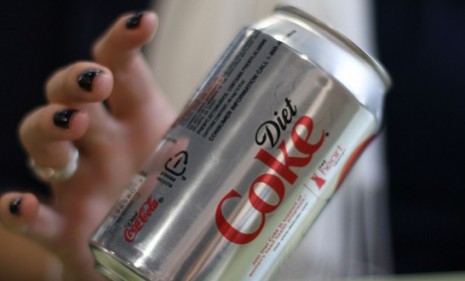Are diet sodas making you fat?
Low-calorie drinks were never a miracle weight-loss drug, but it turns out they may actually be costing you victory in the battle of the bulge

A free daily email with the biggest news stories of the day – and the best features from TheWeek.com
You are now subscribed
Your newsletter sign-up was successful
Diet sodas: A sweet-tasting, calorie-free reprieve from the doldrums of boring diets? Apparently, not so much. Diet drinks, it turns out, might actually make you heavier, according to two new studies. Sure, the health benefits of diet drinks have been called into question before, with recent studies linking artificially sweetened drinks to an increased risk of heart disease. But many guzzlers of diet drinks have long regarded their favorite beverages as health neutral, since they lack both calories and fat. Are those dreams now dashed? Here, a brief guide to these new findings:
What did the researchers find?
Regular consumption of diet drinks expands one's waist over time, according to one study at the University of Texas Health Science Center at San Antonio. A second study supported previously made associations between diet soda and the risk of diabetes. Researchers fed aspartame (the artificial sweetener in diet sodas) to diabetes-prone mice, and found that mice on the aspartame diet had higher blood sugar than the mice who didn't consume the chemical.
The Week
Escape your echo chamber. Get the facts behind the news, plus analysis from multiple perspectives.

Sign up for The Week's Free Newsletters
From our morning news briefing to a weekly Good News Newsletter, get the best of The Week delivered directly to your inbox.
From our morning news briefing to a weekly Good News Newsletter, get the best of The Week delivered directly to your inbox.
Forget the mice. How do they know diet soda expands waistlines?
Researchers recorded the height, weight, waist circumference, and diet soda intakes of 474 participants. They then measured again in three follow-up exams over two decades. Diet soda drinkers experienced 70 percent greater increases in waist circumference than non-drinkers. Those who said they were frequent drinkers — consuming two or more diet sodas a day — experienced waist circumference increases that were 500 percent greater than those who didn't drink diet soda at all.
How is that possible?
That is still unknown, but researchers speculate that the artificial sweeteners warp appetite, leaving diet soda drinkers hungry for unhealthy treats.
A free daily email with the biggest news stories of the day – and the best features from TheWeek.com
Does exercise play a role?
Nope. The results were the same for all diet soda drinkers, even after factors such as exercise, social class, education, and smoking were taken into account.
So, no more diet drinks?
Perhaps diet soda drinkers should consider cutting back. "The fizzy chemical cocktail can still do a number on your health," says Margaret Harmann at Jezebel. "It may be time to rethink your commitment to being comprised of 70 percent Diet Coke." Helen Hazuda, the professor who conducted the study, stopped drinking diet sodas, saying, "They may be free of calories but not of consequences."
Sources: Daily Mail, Jezebel, Science Blog
-
 How to Get to Heaven from Belfast: a ‘highly entertaining ride’
How to Get to Heaven from Belfast: a ‘highly entertaining ride’The Week Recommends Mystery-comedy from the creator of Derry Girls should be ‘your new binge-watch’
-
 The 8 best TV shows of the 1960s
The 8 best TV shows of the 1960sThe standout shows of this decade take viewers from outer space to the Wild West
-
 Microdramas are booming
Microdramas are boomingUnder the radar Scroll to watch a whole movie